
The Latest Google Search Console Updates: What You Need to Know by @sam_marsden
Updates to Google Search Console are coming fast and furious. Even for the most eagle-eyed of SEO professionals, it can be hard to keep on top of all of the latest developments.
As such, I thought it would be helpful to provide an easy-to-digest overview of what we know about Google’s plans to migrate features over from the old version, as well as looking at the evolution of the new version of Search Console.
I’ll aim to keep this post updated with the latest releases and developments, but don’t hesitate to drop me a message if I’ve missed anything.
What’s Been/Being Migrated to the New Search Console?
The chief source of confusion about the new version of Search Console has been around how Google is dealing with the transition from the old version, as not all of the features are being moved directly into the new version.
Instead, Google is taking the opportunity to reassess the tools and reports that they provide to be more useful for users and to align more closely with the evolving challenges that SEO professionals now face.
After a few dribs and drabs of information on what is and isn’t being migrated to the new version, Google has helpfully published a post clarifying their plans.
Here’s a rundown of Google’s plans as they stand.
Shiny New Reports & Tools
Performance
The Performance report has been around for almost a year now and was the first feature to be launched in the beta version of Search Console.
Along with the sexy new UI, the biggest benefit of the Performance report, compared to the old Search Analytics report, is the extension of the date range to incorporate 16 months of data, instead of 3 months.
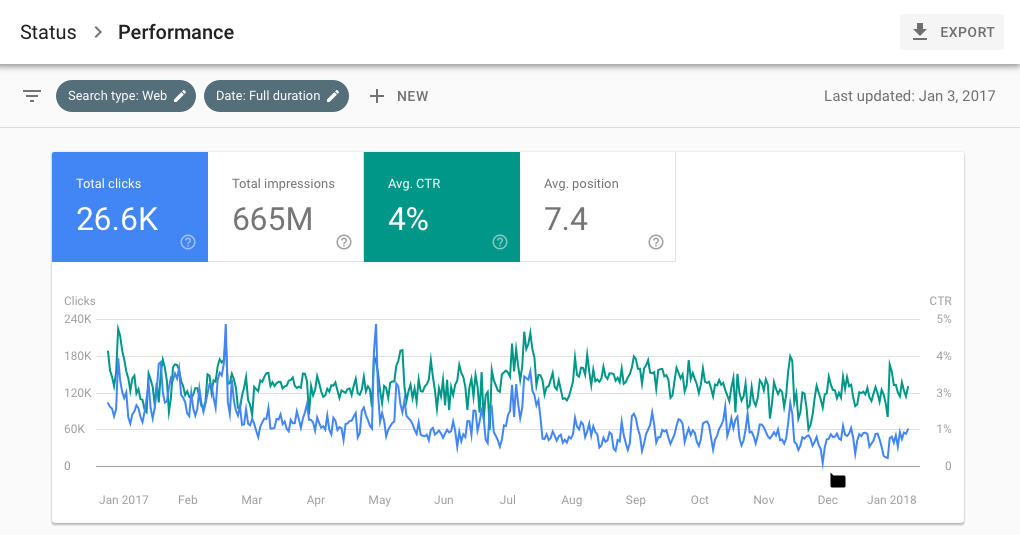

The Performance report provides click, impression, CTR, and average ranking metrics at a page, query, country, and device level.
What does it replace?
Search Analytics.
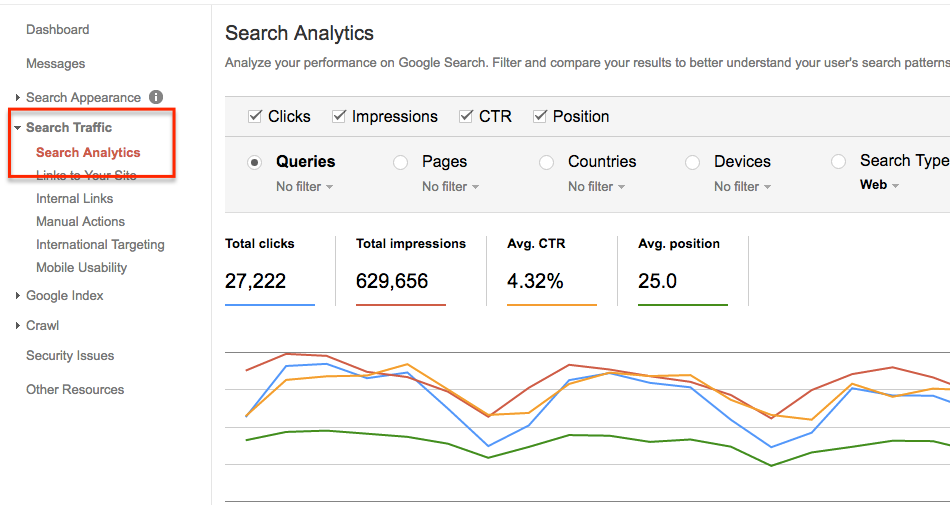

How could it be improved?
While the Performance report has been a welcome addition, it isn’t without its faults. I expect that we’ll see further updates once the migration to the new version has been completed.
Here are a few of the ways that it could be improved:
- Trending: 16 months of organic search data is great and all, but it’s difficult to establish trends when you can’t aggregate data beyond the default daily data points. For example, we’ve doubled organic clicks to the DeepCrawl site over the past 12 months, yet the graph in the Performance report for that period doesn’t clearly tell that story. Being able to toggle between daily, weekly and monthly aggregation would be a handy addition.


- Date comparison: Setting up custom comparison date ranges is fiddly as you need to use four different calendar selectors. This could be improved by using one calendar selector, using something similar to Google Analytics.
- Filtering: The Performance report is a goldmine for organic insights, but it is repetitive and time-consuming to have to set the necessary filters every time you re-enter Search Console. I’d really like to see some more customization introduced to Search Console. It would be helpful if you were able to save filtered reports and pin them to the Overview page. There’s a lot of value in pulling Search Console data into dashboarding platforms like Data Studio, but not everyone is going to have time for this so Google needs to make it as easy as possible to extract insights.
Index Coverage Report
Launched alongside the Performance report at the birth of the new version of Search Console, the Index Coverage report is a welcome evolution of the Crawl Errors and Index Status reports.
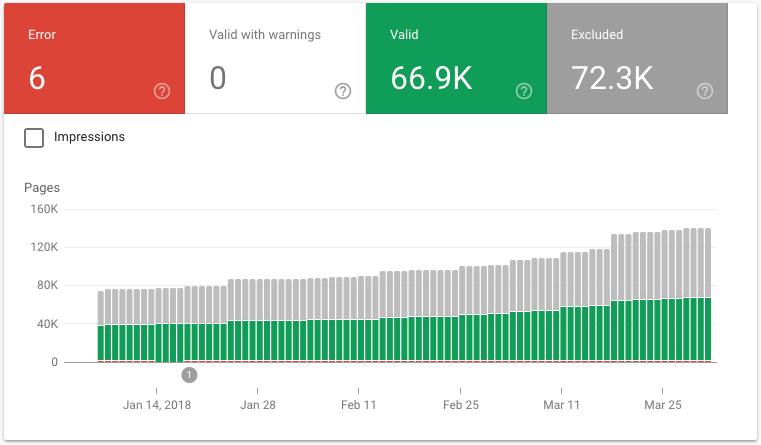

The new Index Coverage report provides site-level insights regarding crawling and indexing issues.
This report will flag problems with pages submitted in a sitemap (e.g. submitted pages that are 404s, blocked by robots.txt, marked as noindex, etc.) as well as providing trends on indexed (valid) pages.
What does it replace?
Index Status and Crawl Errors.
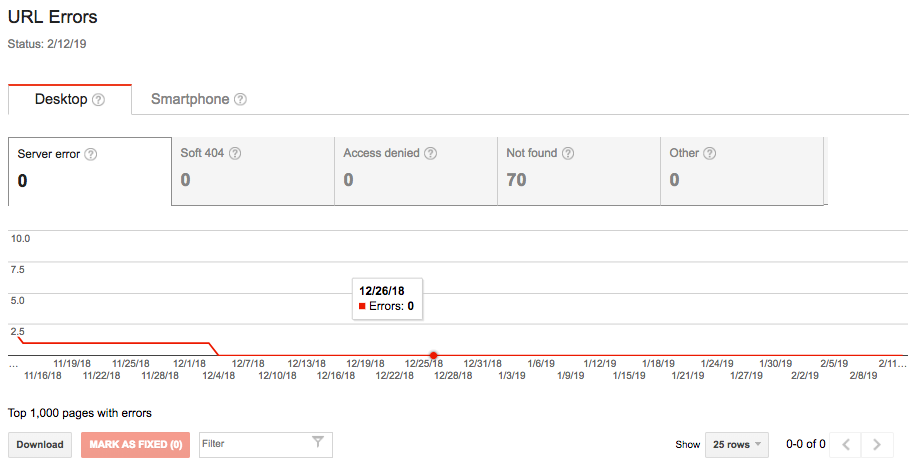

How could it be improved?
The Index Coverage report is a useful component to the Search Console suite because it enables you to get a top-level view of the crawling and indexing issues directly from Google. However, it isn’t without its limitations:
- Limited rows: When you dig into the issues flagged by Index Coverage you’re limited to 1,000 rows of URLs. While 1,000 pages will provide more than enough instances to diagnose and fix issues on most sites, it can make things tricky for larger sites with millions of pages.
- Vague explanations: Some of Google’s explanations of the issues they flag can be frustratingly vague. For example, the description of the “Crawled – currently not indexed” issue is described as follows: “The page was crawled by Google, but not indexed. It may or may not be indexed in the future; no need to resubmit this URL for crawling.”It’s difficult to understand what could be causing these pages not to be indexed, perhaps it’s a quality issue. In these cases, it is often worth using the URL Inspection tool for the flagged pages to conduct a deeper investigation.
URL Inspection
The URL Inspection tool is a more recent addition to Search Console and compliments the Index Coverage report well, providing granular URL-level analysis.
The tool is massively useful as it stops Google’s crawling and indexing behavior from being as much of a black box and gives SEO professionals more of a basis for debugging.
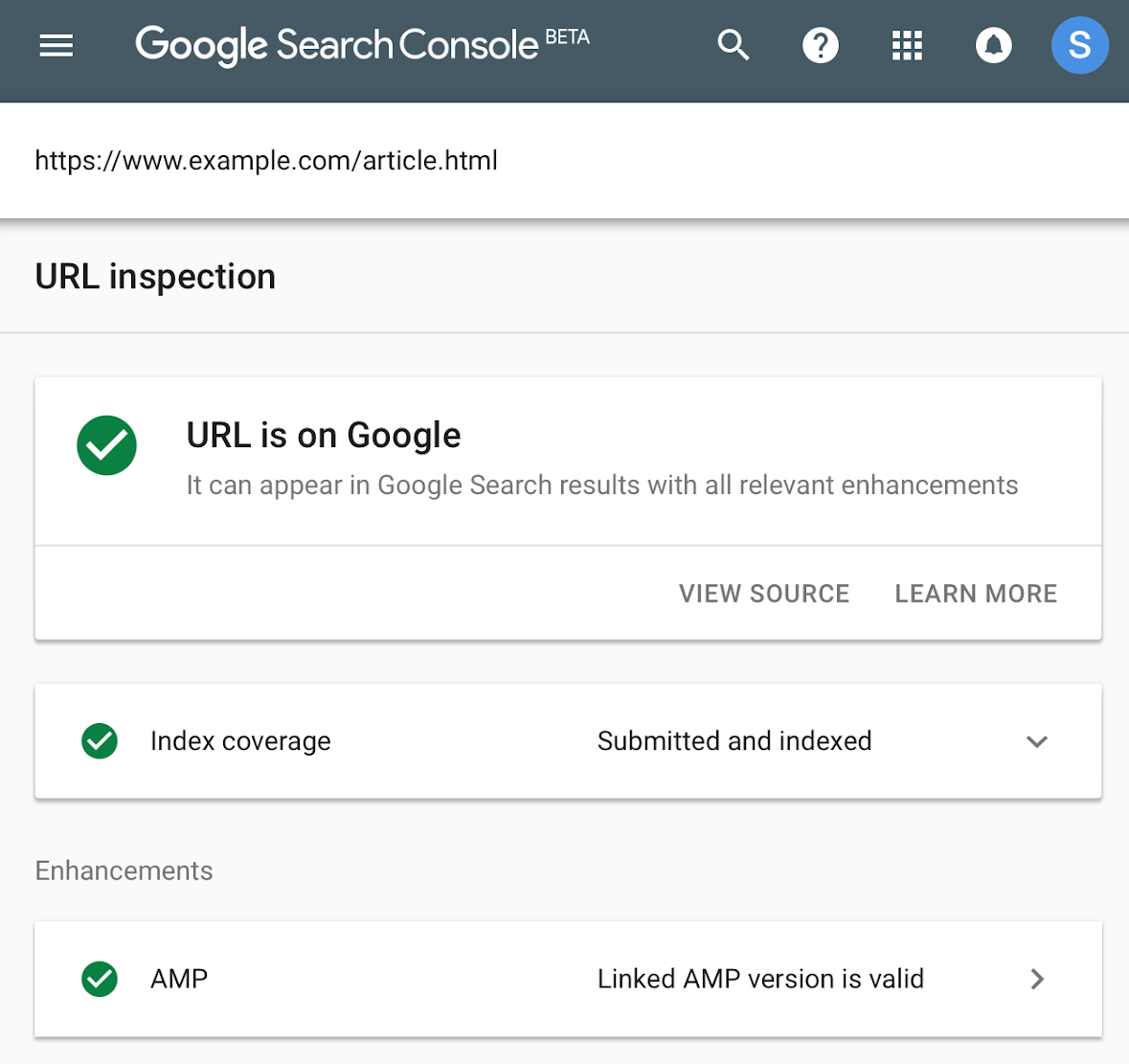

More recently, Google has added further functionality to URL Inspection including the ability to test the live URL, see the rendered page, detect page resources that couldn’t be loaded as well as JavaScript errors.
What does it replace?
Fetch as Google, Crawl Errors, Blocked Resources.


How could it be improved?
As with the Performance and Index Coverage reports, URL Inspection isn’t perfect:
- Deprecating Fetch as Google: Google is planning on phasing out Fetch as Google next month (March 2019). The general consensus is that it would be better to keep it as well as the new screenshot provided in the URL Inspection tool. The problem is that some functionality within Fetch as Google will be lost that hasn’t been replicated in the Inspection tool (e.g., a side-by-side comparison of how Googlebot and a user sees a page, a running history of fetched pages, and a reasonable space with which to see the rendered screenshot in).
- Page resource loading discrepancies: Google’s John Mueller stated in a recent Webmaster Hangout that embedded resources might not be loaded in a live test of the page in the Inspection tool, as they want to provide quick insights. For the purposes of indexing, these resources may well be loaded, but this isn’t necessarily what the Inspection tool will report.
Direct Replacements
Not all of the reports in Search Console are getting a complete revamp, some are simply getting a new lick of paint by being updated to Material Design.
- Links to your site and Internal links becomes Links.
- Sitemaps report becomes Sitemaps.
- Accelerated Mobile Pages becomes AMP status.
- Mobile usability stays as is.
- Security Issues becomes Security Issues report.
Deprecated
Not all of the reports from the old version of Search Console have made the cut and Google have decided to deprecate a few for various reasons.
HTML Improvements
HTML improvements is a simple report in the old version of Search Console that communicates on-page issues including ones concerning title tags and meta descriptions.
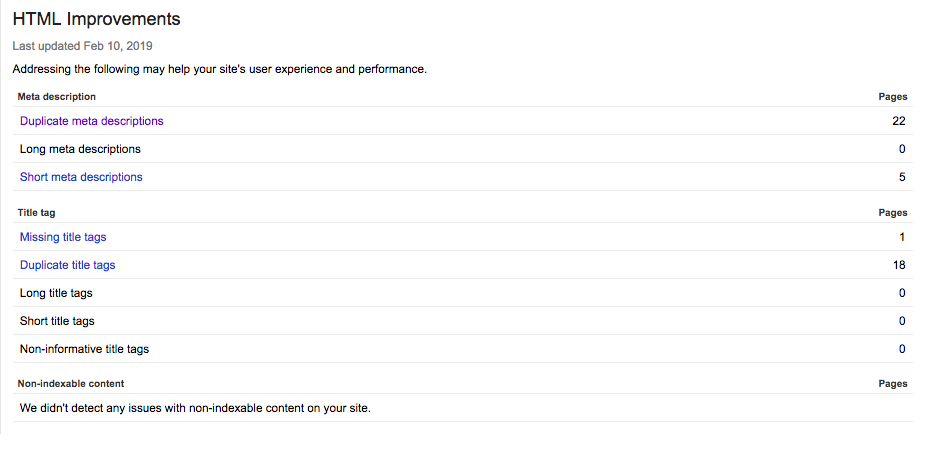

When is it being deprecated?
Not known.
Why is it being deprecated?
This report is a real relic of Search Console and is rightly being scrapped. The report provides limited insights into on-page issues, so the team at Google has likely acknowledged there are plenty of other tools that do a better job of this type of best practice issue detection.
Additionally, flagging issues with title tag and meta description length is a bit of a gray area these days due to various tests and the fact that Google sometimes rewrites them.
Property Sets
Property Sets have been a way to group individual Search Console properties into one aggregate property. SEO pros typically use this to combine different variations of a domain into one view (e.g. subdomains, www/non-www, and HTTP/HTTPS).
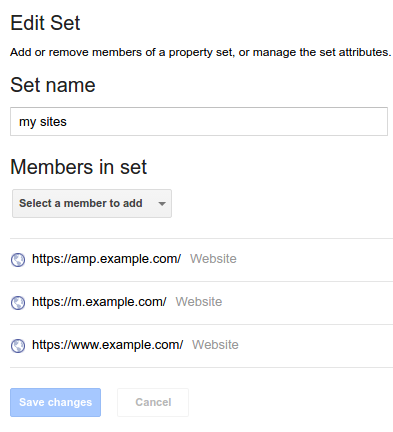

When is it being deprecated?
March 2019.
Why is it being deprecated?
Google has decided to get rid of property sets as they’re only used by a small number of users.
However, Google has released an invite-only experimental feature in the past few months called Domain Properties, which is a rethinking of Property Sets.
Domain Properties will provide a more comprehensive view of a domain as a whole and negate the need to create separate properties for variations of that domain.
Android Apps
Historically, Search Console has provided features to help monitor the visibility of apps in Google’s index, such as creating an app as a property in Search Console and Fetch as Google for apps.
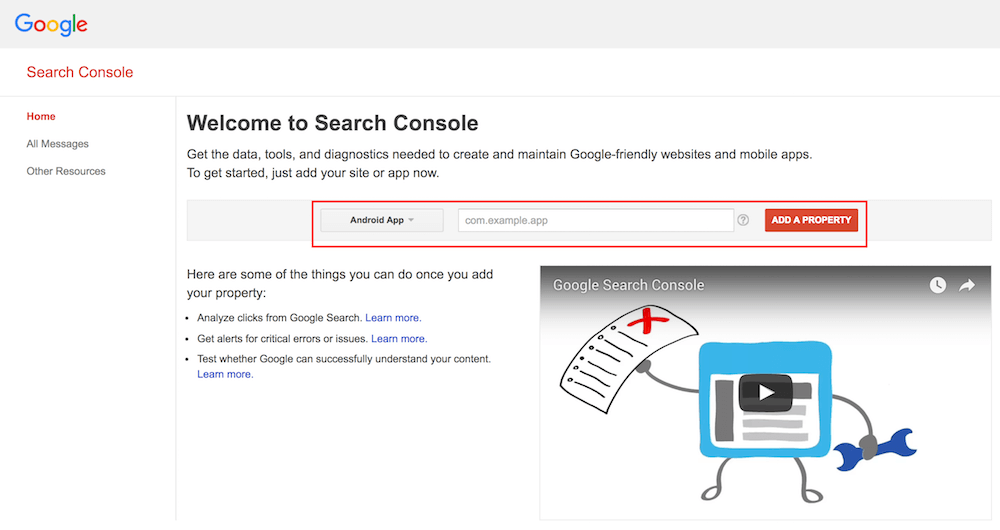

When is it being deprecated?
March 2019.
Why is it being deprecated?
App indexing is now handled in Firebase (formerly Google App Indexing). As such, Google has gradually been switching off app indexing features in Search Console over the past year.
To Be Determined
While Google has done a relatively good job of transferring (and building on) their capabilities into the new Search Console, they have openly admitted that it is yet to be decided how the following tools and tasks will be accommodated:
- Crawl Stats data (pages crawled per day, KB downloaded per day, page download times)
- Robots.txt tester
- Managing URL parameters in Google Search
- International targeting (managing hreflang tags or setting a preferred target country)
- Data highlighter tool
- Reading and managing your messages
- Change of address tool
- Setting preferred domain
- Associating your Search Console property with an Analytics property
- Disavow links
- Removing outdated content from the index
- Blocked resources report
- Structured data report
What Other Changes Do You Need to Know About?
Outside of the nitty-gritty of the planned report migrations, Google has provided several more general updates about the new Search Console
- Old Search Console to be out of action by 2019: This month, Mueller informed us that the team was planning to phase out the old version of Search Console by the end of 2019.
- Consolidating your website traffic on canonical URLs: This month, Google has also decided that data in the Performance report is to be consolidated to canonical URLs. The benefits are that it “unifies all search metrics for a single piece of content into a single URL”, however, it would be nice to have the option to access the raw data as well (this toggle is being phased out on April 10).
- Planned move to Domain Properties: In November 2018, Google started giving invite-only access to a new Domain Properties feature that will give a more comprehensive view of domains in Search Console and will replace Property Sets.
- Search Console stats in SERPs: In October 2018, Google started to show metrics from the Performance report directly in SERPs.
- User management: In August 2018, Google launched a more sophisticated user management system that enables all users to see and (if appropriate), manage user roles for all property users.
Wrapping It Up
It is important for all of us in SEO to make sure our opinions are heard either through Search Console’s feedback form or on Twitter.
It’s promising that Google is actively asking for feedback, which suggests they open to taking user feedback onboard.
Providing constructive feedback will help ensure we don’t lose any of the key parts of the old version of the tool while shaping the way in which new features are built.
Saying that, Search Console is coming on leaps and bounds and it’s great to see how Google is adding to its existing functionality and the pace at which this is happening. I’m excited to see how the tool evolves over the coming months.
More Resources:
Image Credits
All screenshots taken by author, February 2019
Subscribe to SEJ
Get our daily newsletter from SEJ’s Founder Loren Baker about the latest news in the industry!






